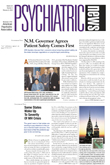A particular variant of the gene that makes the fat-metabolizing enzyme apolipoprotein E (APOE) has acquired considerable notoriety. It is, of course, the E4 variant. Having the E4 variant of the APOE gene increases the risk of developing late-onset Alzheimer’s disease, numerous studies have shown. Having the variant also seems to make people more vulnerable to brain damage following a head injury or to cognitive decline after heart surgery.
Possessing the E4 gene form may not be a total curse, however. It may also speed up response to certain antidepressants, suggests a study conducted by Alan Schatzberg, M.D., chair of psychiatry at Stanford University, and colleagues and in press with Biological Psychiatry.
The study included 246 cognitively intact subjects aged 65 years or older with major depression. The subjects were randomly chosen to receive either 20-40 mg daily of the antidepressant paroxetine or 15-45 mg daily of the antidepressant mirtazapine over an eight-week period. All subjects were assessed to see whether they carried either one or two copies of the E4 variant of the APOE gene.
Results revealed that 92 subjects who were given paroxetine did not have an E4 variant, whereas 30 did, and 93 who were given mirtazapine did not have an E4 variant, whereas 31 did; thus, 25 percent of subjects taking paroxetine and 25 percent of subjects taking mirtazapine had one or more copies of the variant. Finally, the researchers assessed the clinical outcomes for all four groups of subjects and compared them.
Subjects receiving paroxetine and possessing an E4 gene form, the scientists found, had responded slower to paroxetine than had subjects getting paroxetine but not possessing the E4 gene variant. This finding suggested that having the maverick E4 form impaired antidepressant response—exactly what the researchers had anticipated. However, mirtazapine subjects with the E4 variant had responded faster to mirtazapine than the mirtazapine subjects without the E4 form. This finding suggested that having the E4 variant enhanced the antidepressant response—something that the investigators had not expected.
What’s more, these differences in response could not be explained by antidepressant dosage, antidepressant compliance, gender, ethnicity, baseline depression, or other factors.
Thus, “the APOE E4 allele may affect antidepressant treatment outcome,” Schatzberg and his team concluded in their study report, “but the effect depends on the medication.”
If this is so, then why might having a copy of the E4 gene form speed the impact of mirtazapine, but not that of paroxetine? “The neurobiological basis for the differential effect. . . cannot be determined from [our study’s] results,” the researchers stated in their report. Nonetheless, they proposed this possible explanation: “[W]hereas paroxetine has a primarily serotonergic mode of action, mirtazapine has both serotonergic and noradrenergic actions. [Thus] it is conceivable that in elderly depressed patients, the E4 [gene variant] affects brainstem noradrenergic and serotonergic neurons so that the dual-action-agent mirtazapine results in a rapid response, but the single-action-agent paroxetine has a slower response.”
An abstract of the study, “The Apolipoprotein E E4 Allele and Antidepressant Efficacy in Cognitively Intact Elderly Depressed Patients,” is posted online at www-east.elsevier.com/bps/abstracts/27213abs.htm. ▪
